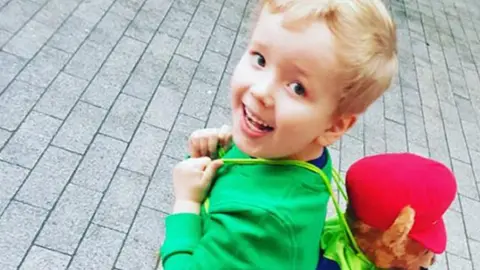Annual memorial game for Blues fan Arthur Labinjo-Hughes
 Family
FamilyBirmingham City Football Club is to dedicate a home game each year to murdered Arthur Labinjo-Hughes to mark his birthday on 4 January.
The first Arthur Memorial Matchday will be on Saturday when the Blues take on Plymouth in the FA Cup at 17:30 GMT.
The six-year-old, a Blues fan, died in June 2020 from a brain injury inflicted by his stepmother Emma Tustin at their West Midlands home.
Tustin and Arthur's father were jailed for his death in December.
Jurors heard he endured a catalogue of torture and abuse, including being denied food and poisoned with salt, during the first lockdown, resulting in him suffering 130 bruises.
He died in hospital a day after Tustin called emergency services.
 West Midlands Police
West Midlands PoliceTustin was jailed for at least 29 years for his murder and Thomas Hughes 21 years for his manslaughter.
Both sentences have been referred to the Court of Appeal after Attorney General Suella Braverman said she believed they were "too low".
Blues fans paid tribute to the six-year-old in December by staging a march to the ground to donate a wreath to the club, which has also renamed its family zone as Arthur's Area.
The club said it had started planning a memorial garden in Arthur's name, and planned to host annual fundraisers to help causes chosen by his family.
Players have been given permission by the Football Association (FA) to wear commemorative shirts with an "Arthur 6" kit printed on for each annual memorial home game which will be sold afterwards.
In agreement with Arthur's family, fundraising proceeds will go towards the NSPCC for the preventive work the charity does with at-risk children in Birmingham, the club said.
From each sale of the matchday programme, the club said it would donate £1 to the charity with programme publishers Ignition Sports Media matching the figure.
Arthur's death sparked anger and grief around the UK and days after his killers were jailed, hundreds attended a vigil near the home where he died.
A national review is under way into his death as well as a local review, after it emerged social workers from Solihull Council had visited his home in the months before he died and found no issues, despite relatives raising concerns.

Follow BBC West Midlands on Facebook, Twitter and Instagram. Send your story ideas to: [email protected]
